Adding seeds to your diet can be a game changer as it can provide sustained energy throughout the day. These seeds are packed with essential nutrients, including protein, healthy fats, fiber, vitamins, and minerals, all of which play a crucial role in supporting energy production and maintaining vitality.
From chia seeds to pumpkin seeds, each type offers its unique nutritional profile, providing a steady energy source to keep you energized and focused from morning to night. In this post, we’ll explore 10 seeds that are particularly effective at boosting daily energy levels, along with their impressive health benefits and delicious ways to incorporate them into your meals and snacks.
Seeds That Help Boost Daily Energy
1. Chia Seeds

Chia seeds are high in omega-3 fatty acids, fiber, and protein, providing a prolonged energy boost. They absorb water and develop a gel-like consistency in the stomach, helping you feel full and energized.
Here are some of the chia seeds health benefits:
Rich in Nutrients: Despite their small size, chia seeds are packed with nutrients. They are an excellent source of fiber, protein, omega-3 fatty acids, calcium, magnesium, and antioxidants.
Good For Digestive Health: The high fiber content of chia seeds can promote digestive health by supporting regular bowel movements and preventing constipation. The gel-like substance formed when chia seeds are mixed with water can also help soothe the digestive tract.
Aids in Weight Loss: Chia seeds are frequently used as a weight reduction supplement due to their high fiber and protein content, which can increase fullness and lower hunger. Furthermore, the gel-like nature of chia seeds can help slow down digestion and absorption of food, allowing you to feel satisfied for longer.
Helps With Heart Health: Chia seeds contain omega-3 fatty acids, specifically alpha-linolenic acid (ALA), which have been showed to reduce inflammation, lower cholesterol, and improve heart health. Regular use of chia seeds may reduce the risk of heart disease and stroke.
Supports Bone Health: Chia seeds have high levels of calcium, magnesium, and phosphorus, all of which are necessary nutrients for strong and healthy bones. Including chia seeds in your diet can improve bone density and lower your risk of osteoporosis.
Regulates Blood Sugar Levels: Chia seeds have a low glycemic index, which means they do not produce rapid blood sugar spikes. Chia seeds’ soluble fiber can also aid limit sugar absorption into the bloodstream, potentially regulating blood sugar levels and lowering the risk of type 2 diabetes.
Overall, chia seeds have several health benefits and are easy to add to a well-balanced diet. Chia seeds are a versatile and nutritious complement to any meal plan, whether sprinkled on yogurt, blended into smoothies, or baked into recipes.
2. Pumpkin Seeds

Pumpkin seeds, often known as pepitas, contain high levels of protein, iron, magnesium, and zinc. These nutrients are essential for energy metabolism, oxygen transport, and immune function, allowing you to stay energetic all day.
Here are some of the pumpkin seed’s health benefits:
Good For Heart Health: Pumpkin seeds contain significant levels of magnesium, antioxidants, and good fats, which promote heart health. Magnesium regulates blood pressure and promotes normal cardiac function, while antioxidants reduce inflammation and protect against oxidative damage. Pumpkin seeds include monounsaturated and polyunsaturated fats, which can help lower LDL cholesterol and lessen the risk of heart disease.
Improves Sleep: Pumpkin seeds are a good source of tryptophan, an amino acid that is converted into serotonin in the body. Serotonin is a neurotransmitter that helps regulate mood and sleep. Consuming pumpkin seeds may promote better sleep quality and help regulate sleep-wake cycles.
Supports Bone Health: Pumpkin seeds are a good source of magnesium, phosphorus, and zinc, all of which are important for bone health. These contribute to bone density, strength, and structure, reducing the risk of osteoporosis and fractures.
Supports Prostate Health: Pumpkin seeds are rich in zinc, a mineral that is essential for prostate health. Some studies suggest that consuming pumpkin seeds regularly may help reduce the risk of benign prostatic hyperplasia (BPH), a condition characterized by an enlarged prostate gland.
Boosts Immune Function: Pumpkin seeds are rich in antioxidants, including vitamin E, carotenoids, and phenolic compounds, which help boost immune function and protect against infections and diseases. The zinc content of pumpkin seeds also plays a crucial role in immune system function and wound healing.
May Help With Weight Loss: Despite being calorie-dense, pumpkin seeds are rich in fiber and protein, both of which can help promote satiety and reduce overall calorie intake. Additionally, the healthy fats in pumpkin seeds can help regulate blood sugar levels and prevent spikes in insulin, which may contribute to weight loss.
Adding pumpkin seeds to your diet is simple and may be done in several ways. They can be eaten raw or roasted as a snack, added to salads, soups, or muesli, or used to top yogurt or smoothie bowls. Pumpkin seeds, regardless of how you eat them, have several health advantages and are an important part of a well-balanced diet.
3. Flaxseeds
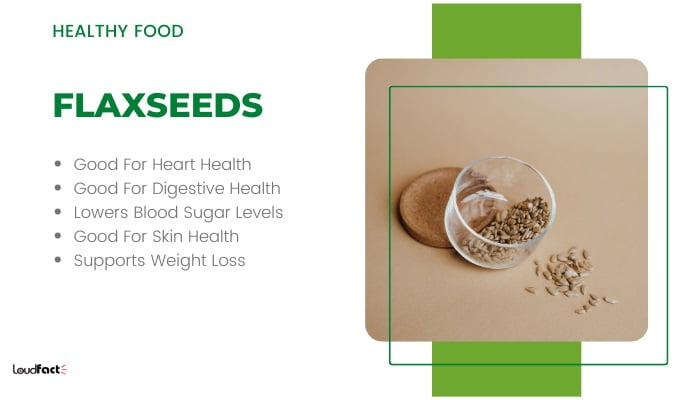
Flaxseeds are high in omega-3 fatty acids, fiber, and lignans, which promote heart health and digestion while providing a consistent source of energy. Ground flaxseeds are more easily digested and can be included in smoothies, yogurt, or muesli.
Here are some of the flaxseed’s health benefits:
Good For Heart Health: The omega-3 fatty acids found in flaxseeds help reduce inflammation, lower blood pressure, and improve cholesterol levels, all of which contribute to heart health. Studies have shown that consuming flaxseeds regularly may help reduce the risk of heart disease and stroke.
Good For Digestive Health: Flaxseeds contain soluble and insoluble fiber, which promotes regular bowel movements and prevents constipation. When flaxseeds are mixed with water, their mucilage content forms a gel-like substance that can relax the digestive tract and relieve symptoms of irritable bowel syndrome (IBS).
Lowers Blood Sugar Levels: Flaxseeds have been shown to help manage blood sugar levels and enhance insulin sensitivity, making them useful for people who have diabetes or are at risk of developing it. Flaxseed soluble fiber inhibits glucose absorption into the bloodstream, which helps reduce blood sugar levels.
Good For Skin Health: Flaxseeds contain omega-3 fatty acids and antioxidants, which maintain healthy skin by lowering inflammation, aiding skin cell regeneration, and protecting against oxidative damage from UV radiation and environmental toxins. Consuming flaxseeds on a daily basis may improve the moisture levels of the skin, elasticity, and overall appearance.
Supports Weight Loss: The high fiber and protein content of flaxseeds can help promote satiety and reduce appetite, making them a useful tool for weight management. Furthermore, the omega-3 fatty acids included in flaxseeds may help promote metabolism and weight loss.
Incorporating flaxseeds into your diet is easy and versatile. They can be ground and added to smoothies, oatmeal, yogurt, or baked goods, or used as a topping for salads and soups. Flaxseeds, regardless of how you eat them, have several health advantages and are an important part of a well-balanced diet.
4. Sunflower Seeds

Sunflower seeds include vitamin E, an antioxidant that protects cells from oxidative damage and improves immune function. They also provide magnesium, which is required for energy production and muscle relaxation.
Here are some of the sunflower seeds health benefits:
Rich in Nutrients: Sunflower seeds are a rich source of vitamins, minerals, healthy fats, and antioxidants. They are particularly high in vitamin E, copper, selenium, magnesium, and various B vitamins.
Good For Heart Health: The high vitamin E content of sunflower seeds acts as an antioxidant, helping to protect cells from damage caused by free radicals and reduce inflammation in the body. Additionally, the healthy fats in sunflower seeds, including monounsaturated and polyunsaturated fats, can help lower LDL cholesterol levels and reduce the risk of heart disease.
Promotes Skin Health: The vitamin E content of sunflower seeds contributes to skin health by protecting against sun damage, reducing inflammation, and promoting skin cell regeneration. Vitamin E also helps maintain skin elasticity and moisture levels, preventing dryness and premature aging.
Regulates Blood Sugar Levels: Sunflower seeds have a low glycemic index, meaning they cause a slow and steady increase in blood sugar levels. The fiber, protein, and healthy fats in sunflower seeds help slow down the absorption of sugar into the bloodstream, preventing spikes in insulin and promoting stable blood sugar levels.
Supports Thyroid Function: Sunflower seeds are a good source of selenium, which is essential for thyroid health and hormone production. Selenium helps regulate thyroid function and may help reduce the risk of thyroid disorders such as hypothyroidism.
Promotes Weight Loss: Sunflower seeds are rich in fiber and protein, both of which help reduce overall calorie intake. Including sunflower seeds in your diet can help you feel fuller for longer and may aid in weight management.
Incorporating sunflower seeds into your diet is easy. They can be eaten raw or roasted as a snack, added to salads, trail mixes, or granola, or used as a topping for yogurt, oatmeal, or baked goods. However you choose to enjoy them, sunflower seeds offer a wide range of health benefits and make a delicious and nutritious addition to your diet.
5. Hemp Seeds
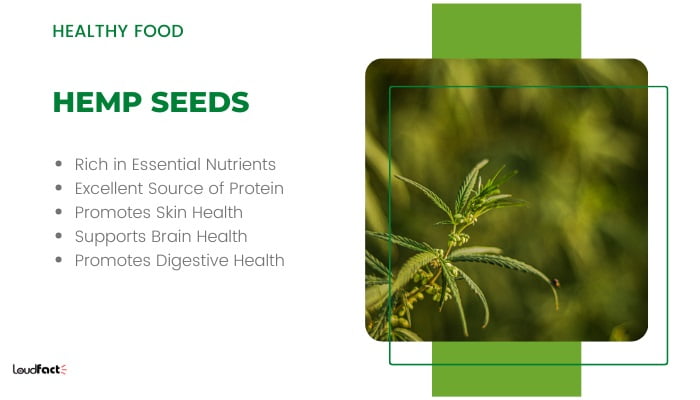
Hemp seeds are high in protein, healthy fats, and magnesium, all of which promote energy production and muscle function. They also include gamma-linolenic acid (GLA), an omega-6 fatty acid that may aid with inflammation.
Here are some of the hemp seeds health benefits:
Rich in Essential Nutrients: Hemp seeds are a nutritional powerhouse, containing a wide range of essential nutrients, including protein, healthy fats, vitamins, minerals, and antioxidants. They are particularly high in protein, providing all nine essential amino acids in a highly digestible form.
Excellent Source of Protein: Hemp seeds are one of the best plant-based sources of protein, making them an excellent choice for vegetarians, vegans, and anyone looking to increase their protein intake.
Promotes Skin Health: The omega-3 and omega-6 fatty acids found in hemp seeds help nourish and moisturize the skin, reduce inflammation, and protect against oxidative damage from UV radiation and environmental toxins. Consuming hemp seeds regularly may help improve skin hydration, elasticity, and overall appearance.
Supports Brain Health: The omega-3 fatty acids found in hemp seeds are important for brain health and cognitive function. They help support the structure and function of brain cell membranes, improve neurotransmitter signaling, and may reduce the risk of neurodegenerative diseases such as Alzheimer’s and Parkinson’s disease.
Promotes Digestive Health: Hemp seeds are a good source of dietary fiber, which helps promote digestive health by supporting regular bowel movements, preventing constipation, and feeding beneficial gut bacteria.
6. Sesame Seeds
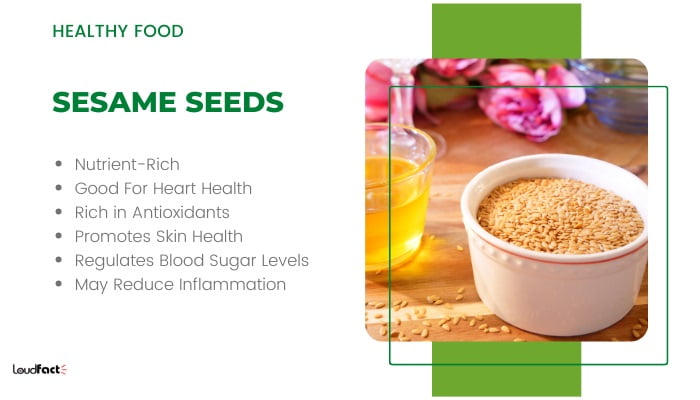
Sesame seeds contain iron, calcium, magnesium, zinc, and B vitamins such as niacin and folate. These nutrients promote red blood cell production, energy metabolism, and nervous system function.
Here are some of the sesame seeds health benefits:
Nutrient-Rich: Sesame seeds are a rich source of essential nutrients, including protein, healthy fats, fiber, vitamins, minerals, and antioxidants. They are particularly high in calcium, iron, magnesium, phosphorus, zinc, and vitamin E.
Good For Heart Health: The high levels of monounsaturated and polyunsaturated fats in sesame seeds, including omega-3 and omega-6 fatty acids, help support heart health by reducing inflammation, lowering LDL (bad) cholesterol levels, and improving cardiovascular function.
Rich in Antioxidants: Sesame seeds are packed with antioxidants, including sesamin, sesamol, and lignans, which help protect cells from oxidative damage caused by free radicals. Antioxidants play a crucial role in reducing inflammation, preventing chronic diseases, and promoting overall health and well-being.
Promotes Skin Health: The vitamin E content of sesame seeds contributes to skin health by protecting against sun damage, reducing inflammation, and promoting skin cell regeneration. Vitamin E also helps maintain skin elasticity and moisture levels, preventing dryness and premature aging.
Regulates Blood Sugar Levels: Sesame seeds have a low glycemic index, meaning they cause a slow and steady increase in blood sugar levels. The fiber, protein, and healthy fats in sesame seeds help slow down the absorption of sugar into the bloodstream, preventing spikes in insulin and promoting stable blood sugar levels.
May Reduce Inflammation: The antioxidants and phytochemicals found in sesame seeds help reduce inflammation in the body. Chronic inflammation is linked to various health conditions, including heart disease, diabetes, arthritis, and cancer.
Adding sesame seeds to your diet is easy. They have a nutty flavor and can be eaten raw or roasted as a snack, added to salads, stir-fries, or baked goods, or used as a topping for sushi, noodles, or vegetables.
Also Read:
- 15 Foods with More Vitamin C than Oranges
- How Many Calories In Brussels Sprouts? Nutrition & Recipe
- Cholesterol Diet: Best Foods To Keep Your Heart Healthy
7. Poppy Seeds
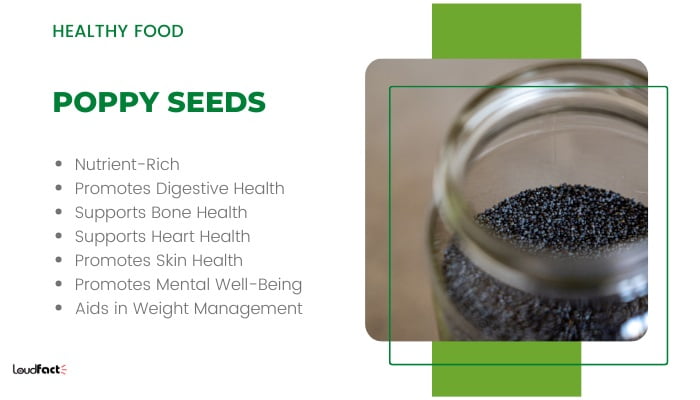
Poppy seeds are high in dietary fiber, protein, and vital minerals such as calcium, iron, and magnesium. They offer a sustained release of energy and can be sprinkled on salads, yogurt, or baked products.
Here are some of the poppy seeds health benefits:
Nutrient-Rich: Poppy seeds are a good source of essential nutrients, including calcium, magnesium, phosphorus, manganese, zinc, and iron. They also contain protein, healthy fats, fiber, and a variety of vitamins, such as vitamin B1 (thiamine) and vitamin B6.
Promotes Digestive Health: Poppy seeds are rich in dietary fiber, which helps promote digestive health by supporting regular bowel movements, preventing constipation, and aiding in the removal of waste and toxins from the body.
Supports Bone Health: Poppy seeds are a good source of calcium, magnesium, phosphorus, and manganese, all of which are essential for bone health. These minerals contribute to bone density, strength, and structure, reducing the risk of osteoporosis and fractures.
Supports Heart Health: The healthy fats found in poppy seeds, including omega-3 and omega-6 fatty acids, help support heart health by reducing inflammation, lowering LDL (bad) cholesterol levels, and improving cardiovascular function. The potassium content of poppy seeds may also help regulate blood pressure and reduce the risk of heart disease and stroke.
Promotes Skin Health: The zinc content of poppy seeds contributes to skin health by promoting collagen production, reducing inflammation, and supporting skin cell regeneration. Zinc also helps maintain skin elasticity and may help alleviate symptoms of acne, eczema, and psoriasis.
Promotes Mental Well-Being: Poppy seeds contain compounds that have mood-enhancing properties and may help alleviate symptoms of anxiety, depression, and stress. Consuming poppy seeds may promote relaxation, improve mood, and enhance overall mental well-being.
Aids in Weight Management: Despite being calorie-dense, poppy seeds are rich in fiber and protein, which help promote satiety and reduce overall calorie intake. Including poppy seeds in your diet can help you feel fuller for longer and may aid in weight management.
8. Pine Nuts

Pine nuts are high in monounsaturated fats, which provide a moderate and constant supply of energy. They also contain magnesium, manganese, and zinc, which promote energy metabolism and immune function.
Here are some of the pine nuts health benefits:
Rich in Nutrients: Pine nuts are a nutrient-dense food, containing a variety of vitamins, minerals, healthy fats, and antioxidants. They are particularly high in vitamin E, vitamin K, magnesium, phosphorus, zinc, and manganese.
Promotes Eye Health: Pine nuts are a good source of lutein and zeaxanthin, two antioxidants that help protect the eyes from oxidative damage caused by UV radiation and blue light. Lutein and zeaxanthin are particularly beneficial for reducing the risk of age-related macular degeneration (AMD), a leading cause of vision loss in older adults.
Weight Management: Despite being calorie-dense, pine nuts are rich in protein, healthy fats, and fiber, which help promote satiety and reduce overall calorie intake. Including pine nuts in your diet can help you feel fuller for longer and may aid in weight management.
Boosts Immune Function: Pine nuts are rich in vitamins, minerals, and antioxidants that help support immune function and protect against infections and diseases. The high levels of vitamin E, vitamin K, and zinc in pine nuts help strengthen the immune system and promote overall health and vitality.
Regulates Blood Sugar Levels: Pine nuts have a low glycemic index, meaning they cause a slow and steady increase in blood sugar levels. The fiber, protein, and healthy fats in pine nuts help slow down the absorption of sugar into the bloodstream, preventing spikes in insulin and promoting stable blood sugar levels.
Promotes Skin Health: The vitamin E content of pine nuts contributes to skin health by protecting against sun damage, reducing inflammation, and promoting skin cell regeneration. Vitamin E also helps maintain skin elasticity and moisture levels, preventing dryness and premature aging.
9. Quinoa Seeds
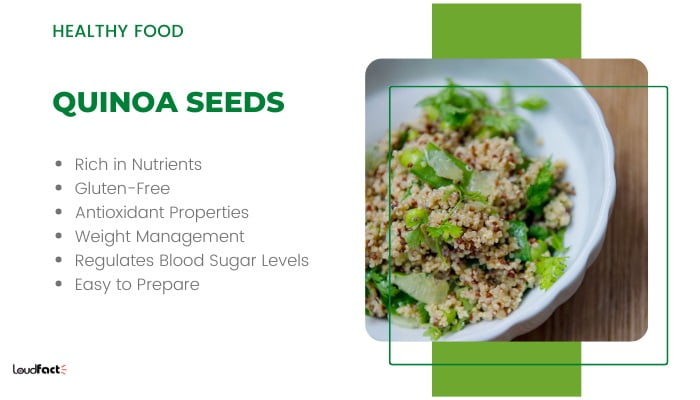
Quinoa seeds, despite being classified as a pseudo-cereal, are a rich source of complex carbohydrates, protein, fiber, and important vitamins and minerals. They give long-lasting energy and can serve as a base for meals or snacks.
Here are some of the quinoa seeds health benefits:
Nutrient-Rich: Quinoa is considered a superfood due to its impressive nutrient profile. It is a complete protein source, meaning it contains all nine essential amino acids, making it particularly beneficial for vegetarians and vegans. Quinoa is also rich in fiber, vitamins (such as B vitamins and vitamin E), minerals (including magnesium, iron, potassium, and zinc), and antioxidants.
Gluten-Free: Quinoa is naturally gluten-free, making it an excellent alternative for people with gluten sensitivity or celiac disease. It can be used as a substitute for grains like wheat, barley, or rye in various recipes, including bread, pasta, and baked goods.
Blood Sugar Regulation: Quinoa has a low glycemic index, meaning it causes a slow and steady increase in blood sugar levels. The fiber, protein, and complex carbohydrates in quinoa help slow down the absorption of sugar into the bloodstream, preventing spikes in insulin and promoting stable blood sugar levels.
Antioxidant Properties: Quinoa contains various antioxidants, including flavonoids, quercetin, and kaempferol, which help protect cells from oxidative damage caused by free radicals. Antioxidants play a crucial role in reducing inflammation, preventing chronic diseases, and promoting overall health and well-being.
Weight Management: Quinoa is low in calories but high in protein and fiber, making it a satisfying and nutrient-dense food choice for weight management. Including quinoa in your diet can help you feel fuller for longer and reduce overall calorie intake, which may aid in weight loss or maintenance.
Easy to Prepare: Quinoa is quick and easy to prepare, requiring minimal cooking time. It can be cooked on the stovetop, in a rice cooker, or even in the microwave. Quinoa can also be purchased pre-cooked or frozen for added convenience.
10. Sacha Inchi Seeds
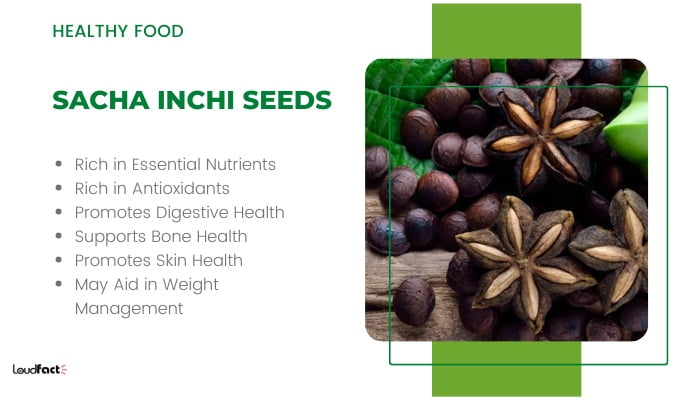
Sacha inchi seeds, also known as Inca peanuts or Inca nuts, are the edible seeds of the Plukenetia volubilis plant native to the Amazon rainforest. These seeds have been used for centuries by indigenous peoples in South America for their nutritional and medicinal properties. Here are some of the key health benefits associated with sacha inchi seeds:
Rich in Essential Nutrients: Sacha inchi seeds are a nutrient-dense food, containing a wide range of essential nutrients, including protein, healthy fats, fiber, vitamins, and minerals. They are particularly high in plant-based protein, providing all nine essential amino acids, making them a complete protein source.
Rich in Antioxidants: Sacha inchi seeds are packed with antioxidants, including vitamin E, vitamin A, and phenolic compounds, which help protect cells from oxidative damage caused by free radicals. Antioxidants play a crucial role in reducing inflammation, preventing chronic diseases, and promoting overall health and well-being.
Promotes Digestive Health: Sacha inchi seeds are a good source of dietary fiber, which helps promote digestive health by supporting regular bowel movements, preventing constipation, and feeding beneficial gut bacteria.
Supports Bone Health: Sacha inchi seeds are a good source of calcium, magnesium, phosphorus, and zinc, all of which are essential for bone health. These minerals contribute to bone density, strength, and structure, reducing the risk of osteoporosis and fractures.
Promotes Skin Health: The vitamin E content of sacha inchi seeds contributes to skin health by protecting against sun damage, reducing inflammation, and promoting skin cell regeneration. Vitamin E also helps maintain skin elasticity and moisture levels, preventing dryness and premature aging.
May Aid in Weight Management: Despite being calorie-dense, sacha inchi seeds are rich in protein, fiber, and healthy fats, which help promote satiety and reduce overall calorie intake. Including sacha inchi seeds in your diet can help you feel fuller for longer and may aid in weight management.
The Bottom Line
Adding seeds to your diet is a simple and effective way to boost your daily energy levels and support overall health and well-being. Whether you sprinkle them on top of yogurt, blend them into smoothies, toss them into salads, or enjoy them as a snack on their own, seeds offer a delicious and nutritious way to fuel your body and support your active lifestyle.




